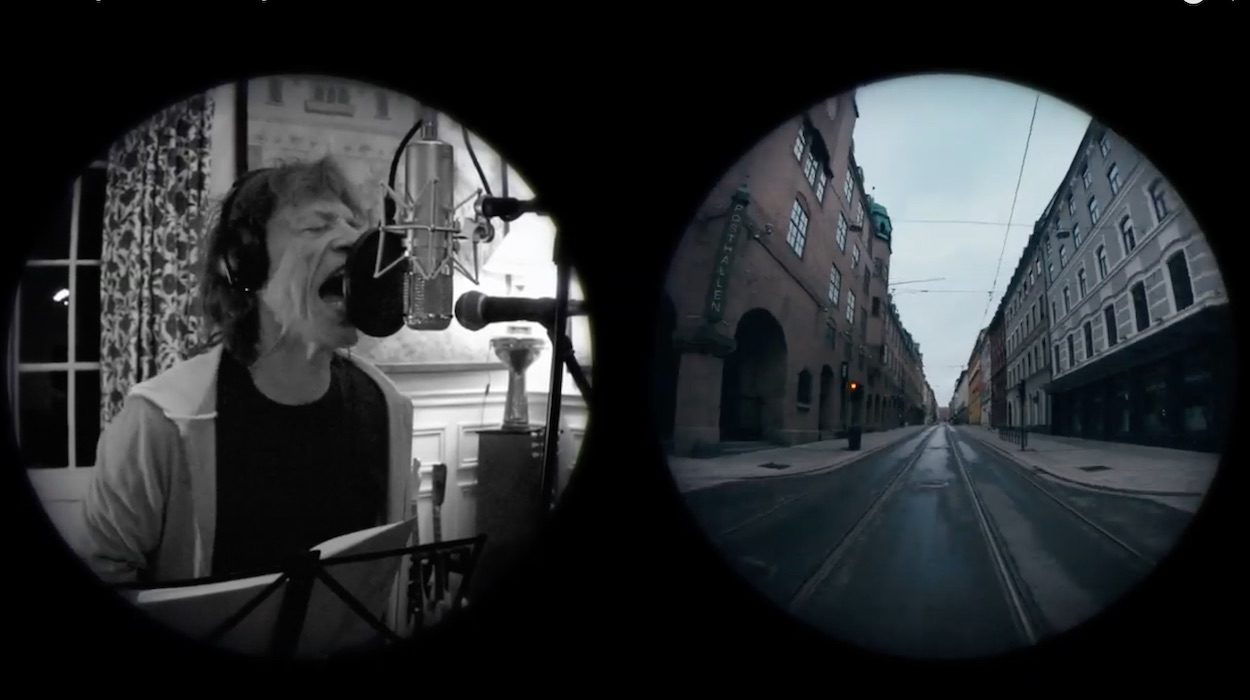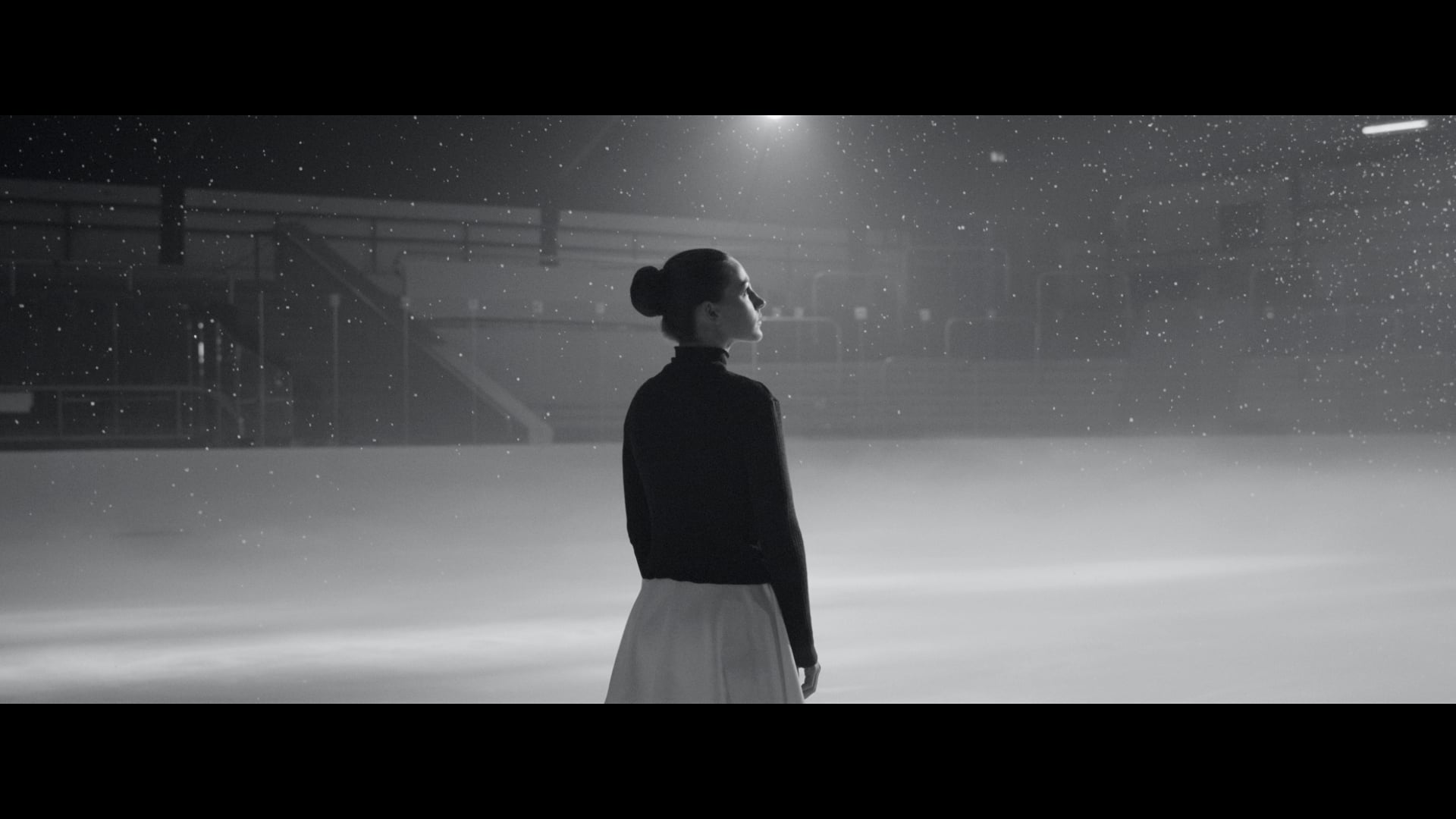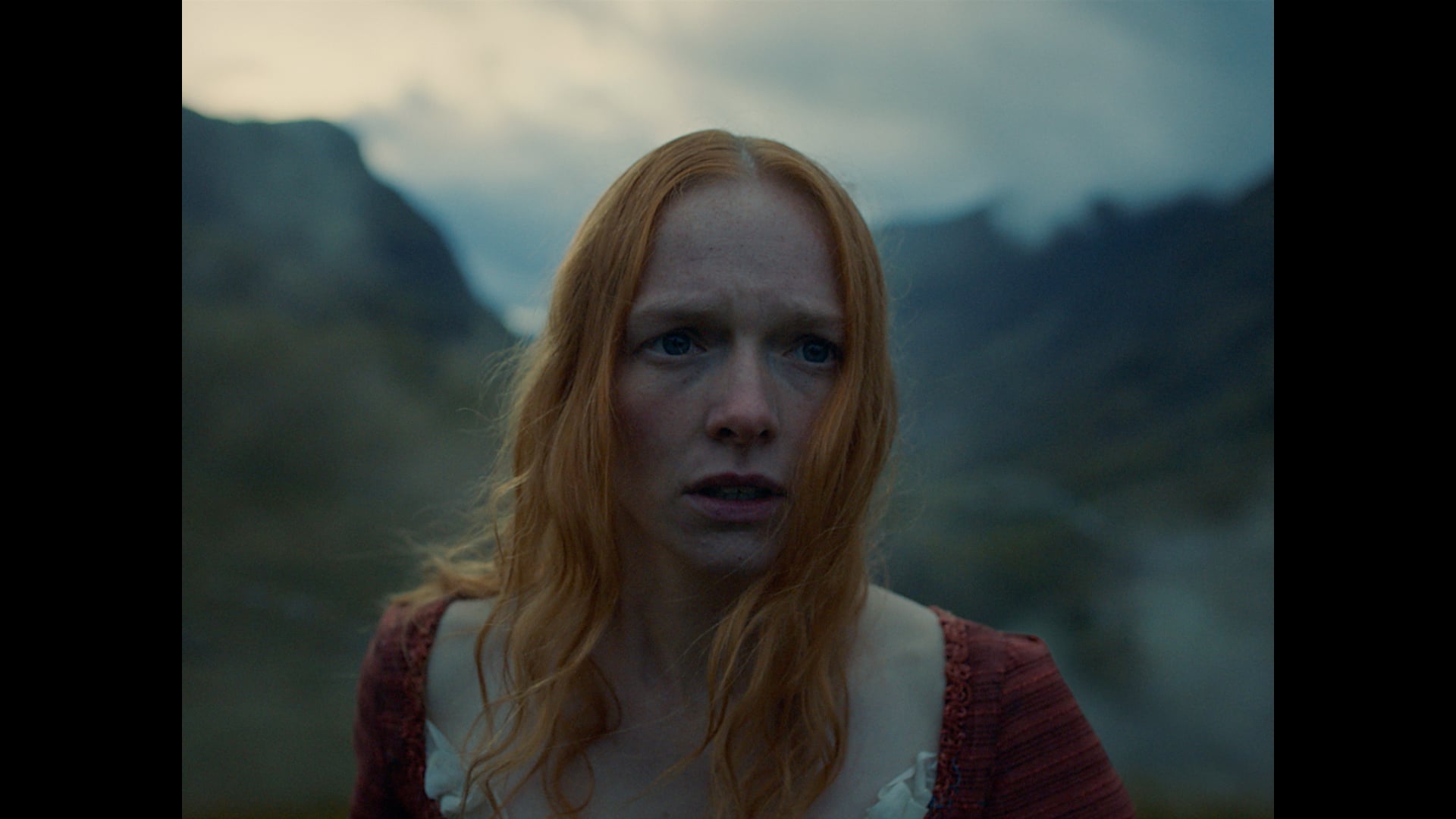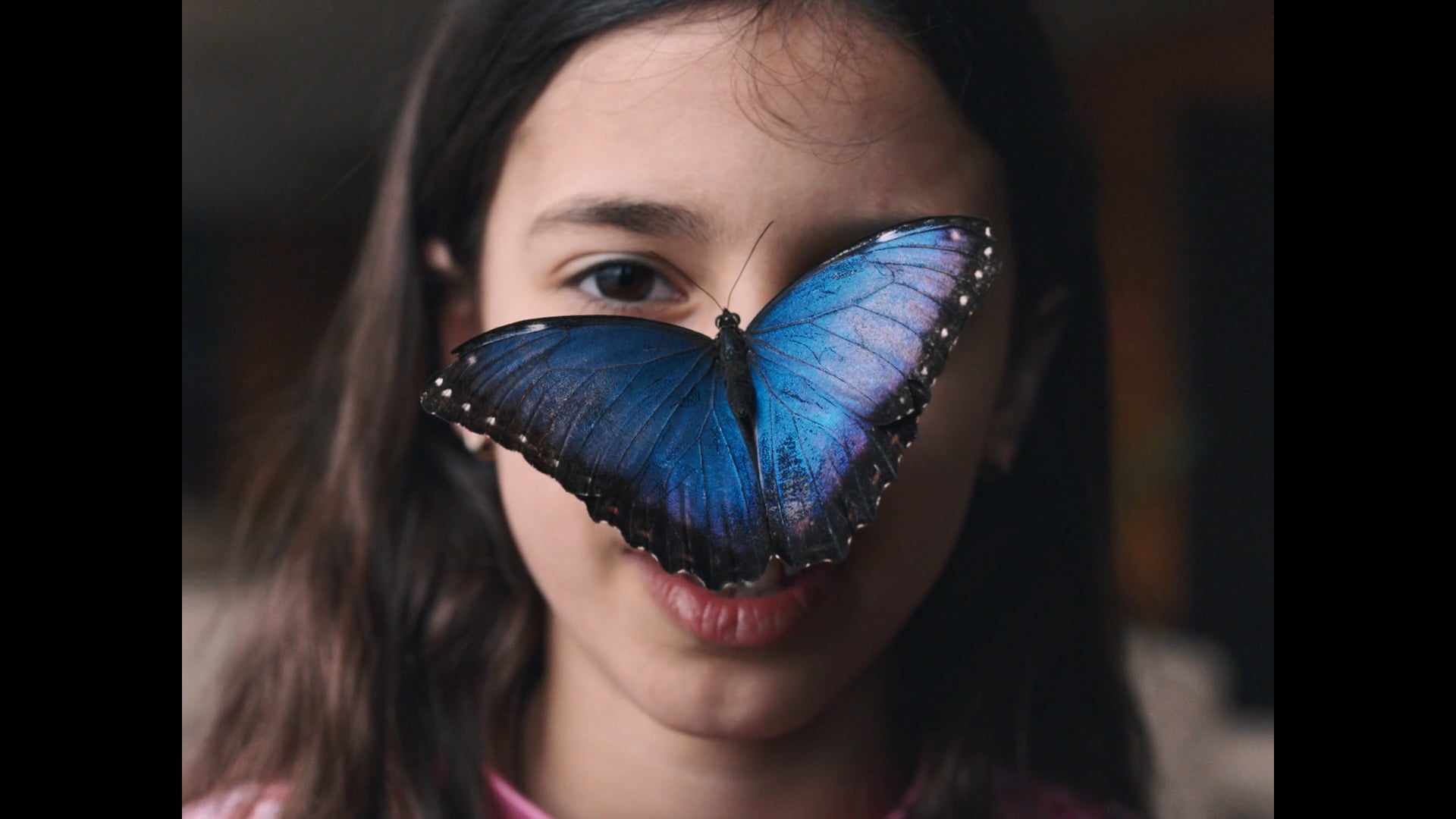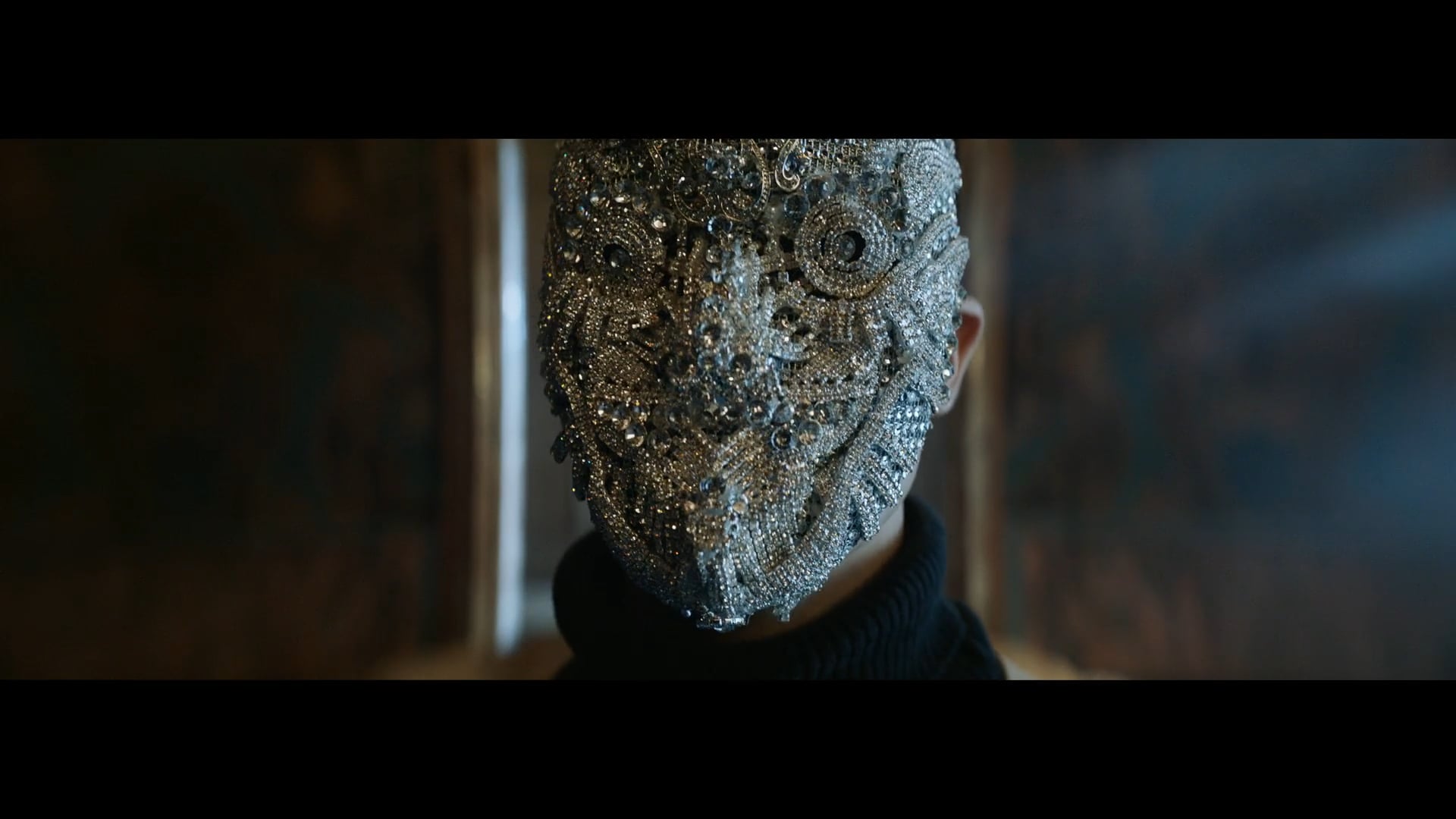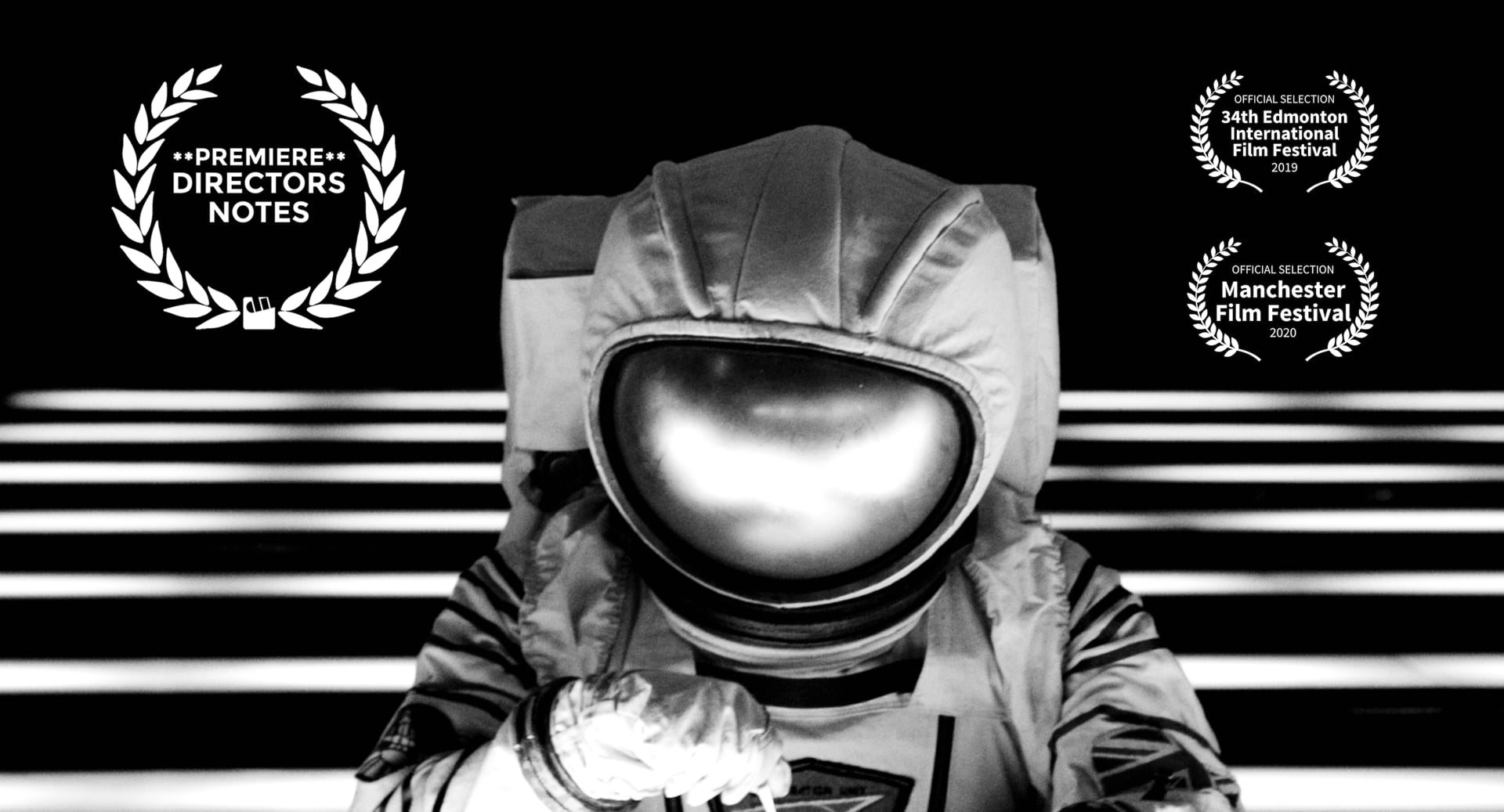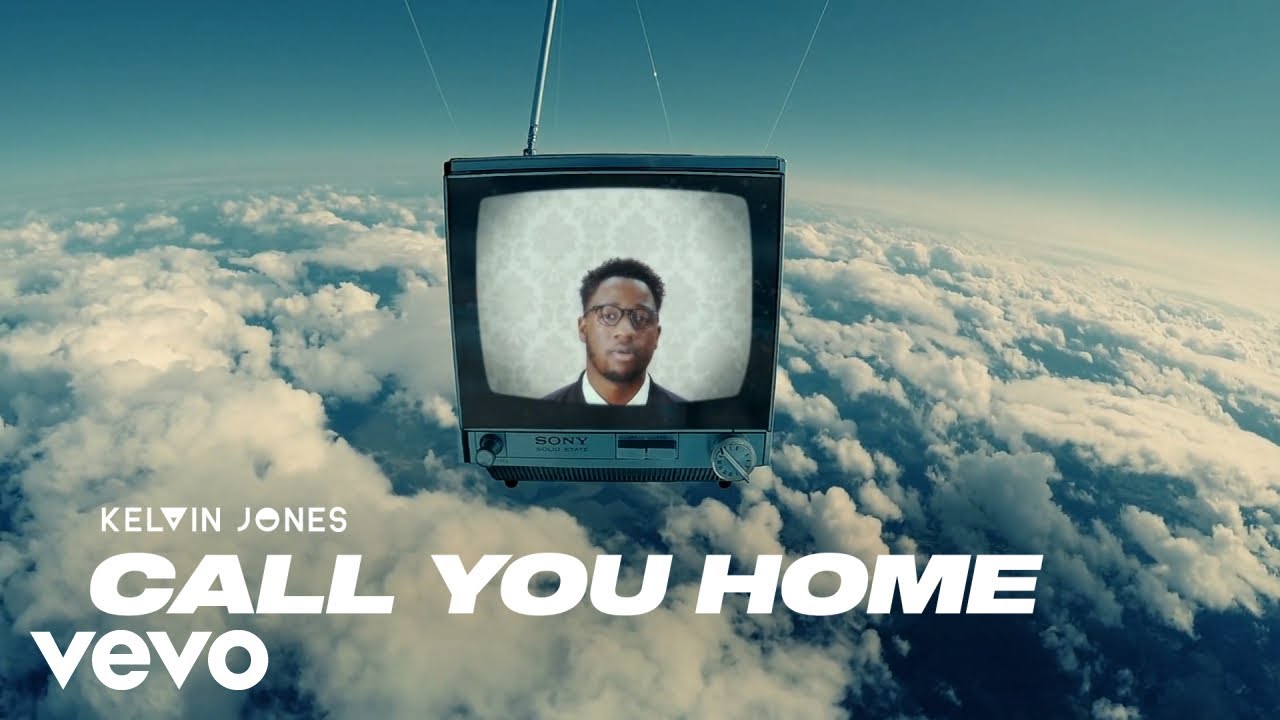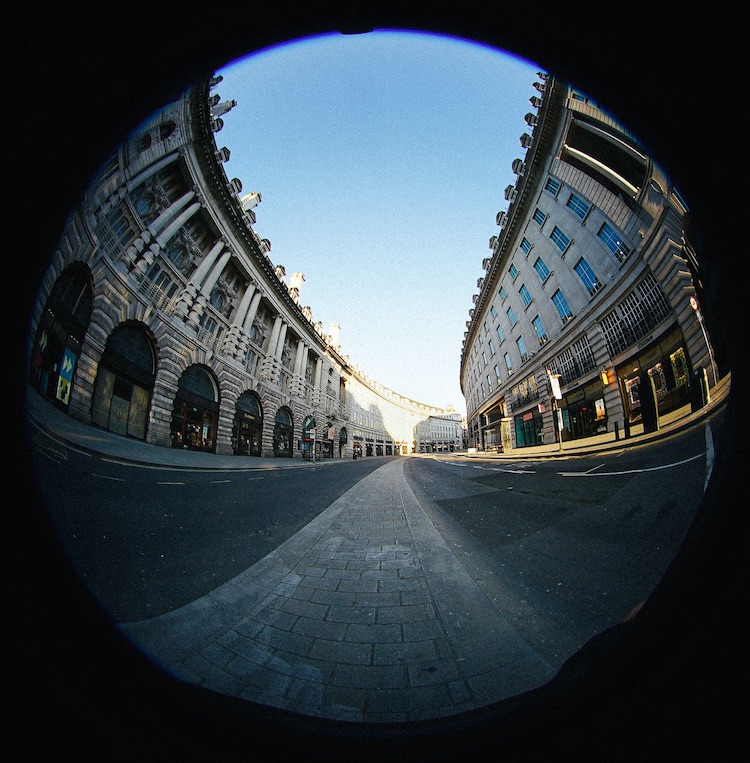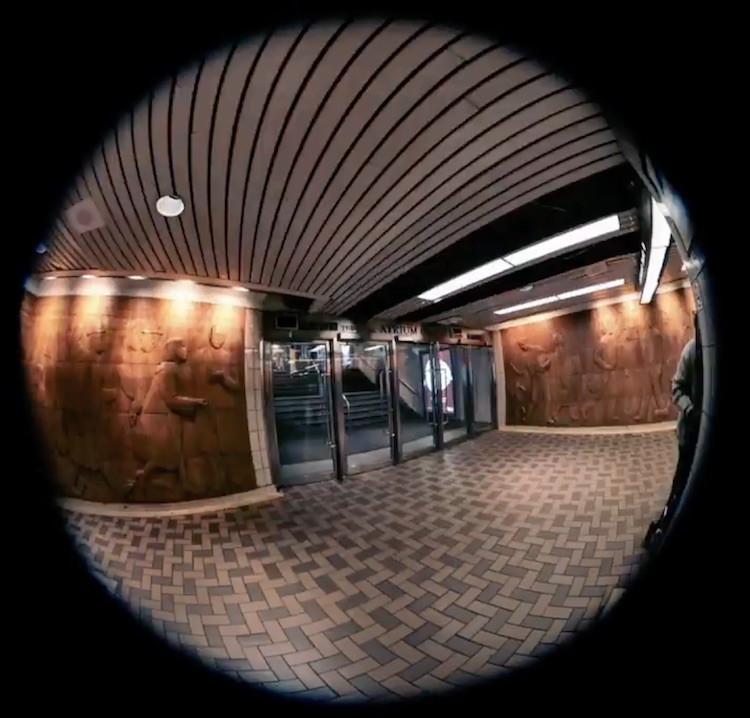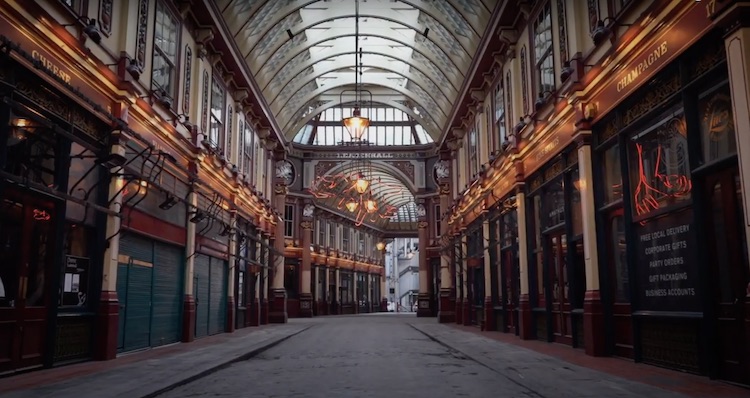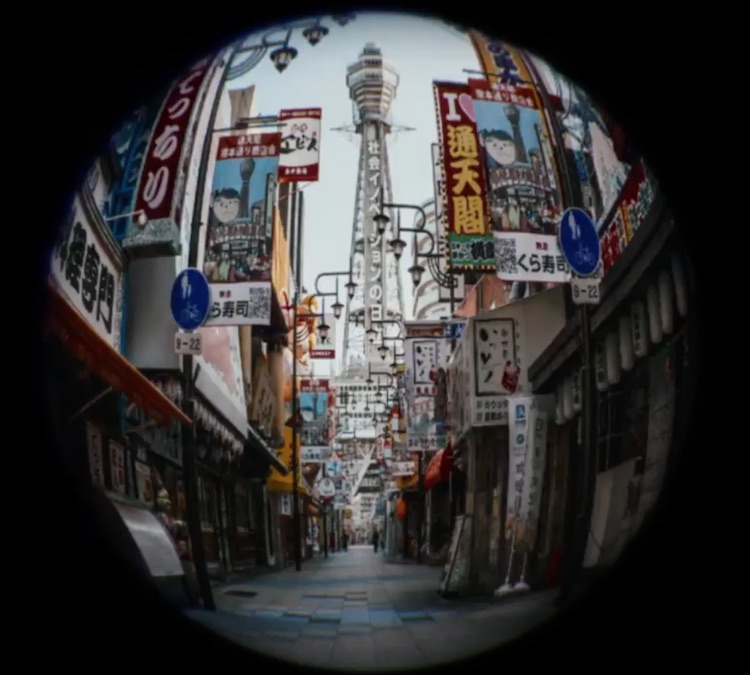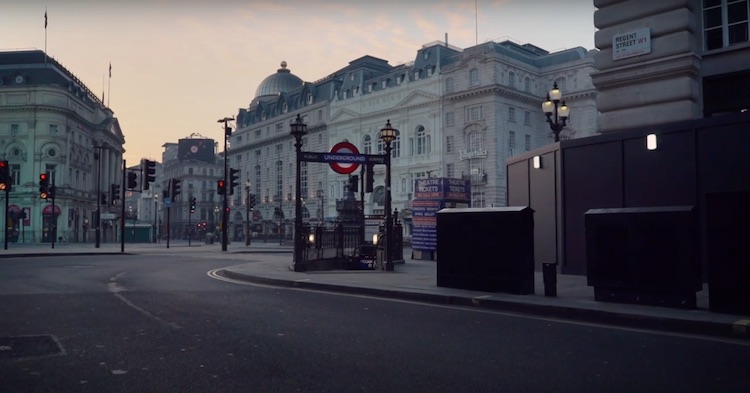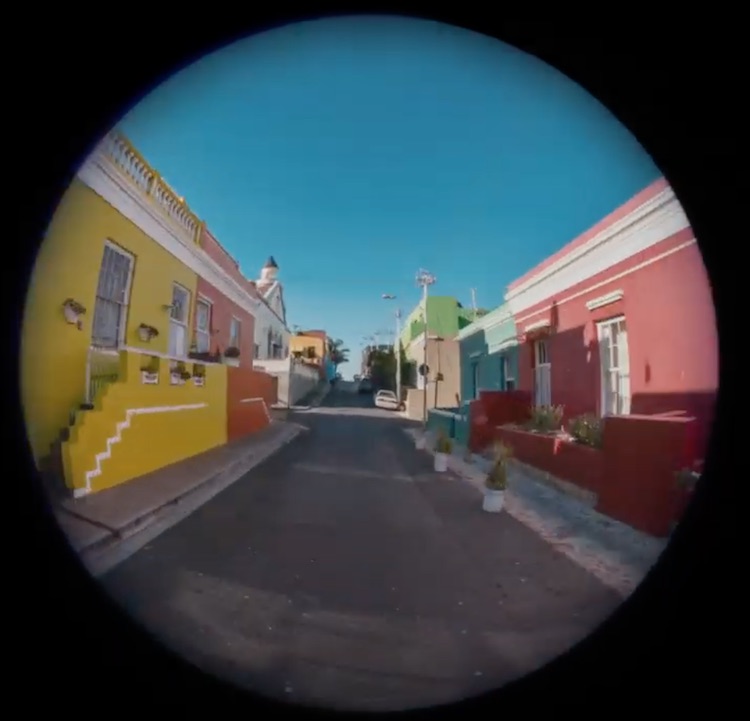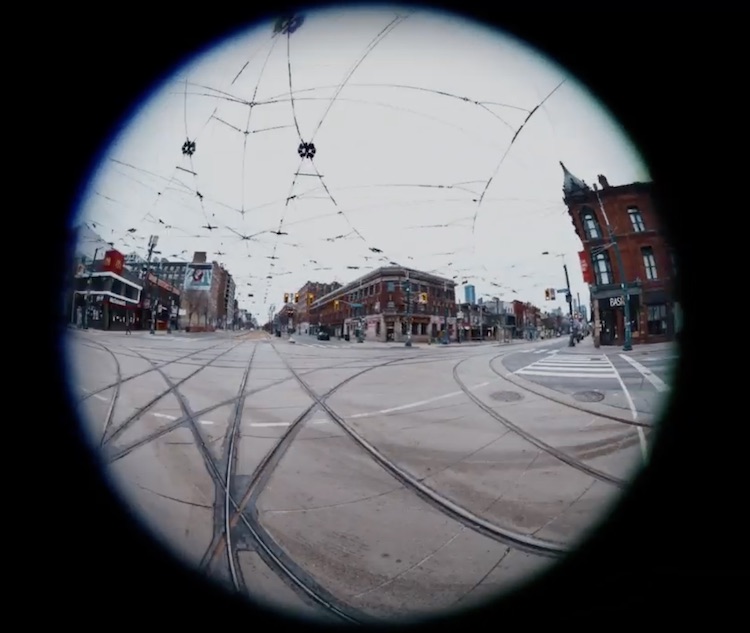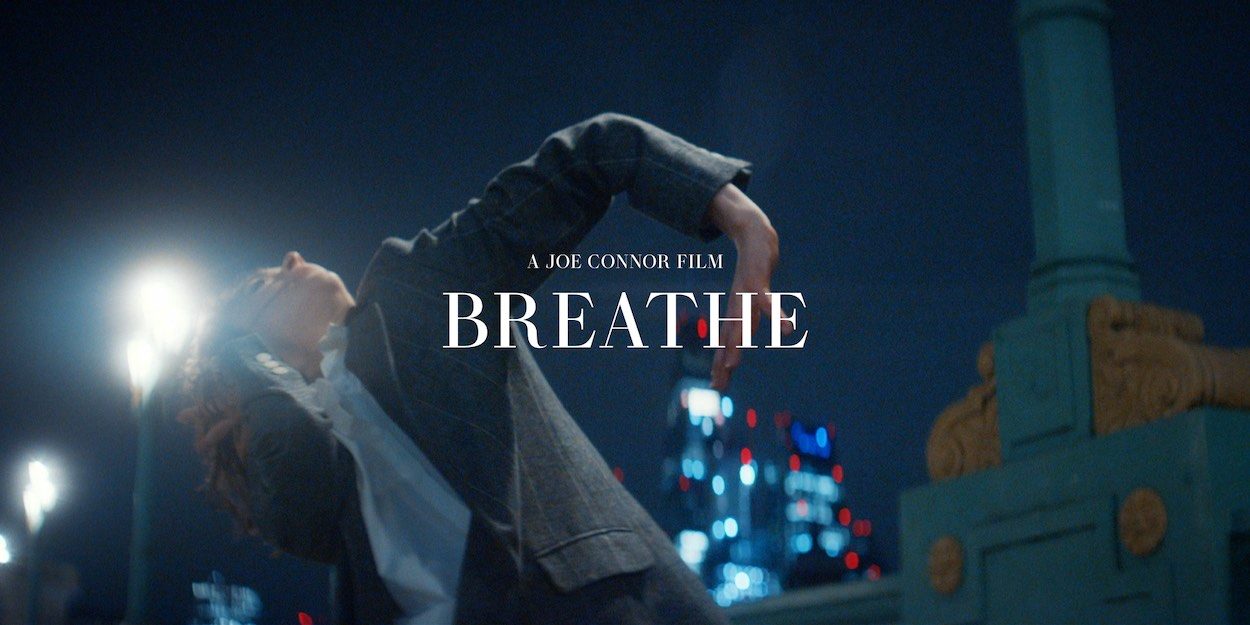All pictures taken from Living in a Ghost Town, directed by Joe Connor
Joe what serendipitous events led you to be at the right place at the right time during lockdown to direct this Stones’ project?
It was quite a normal process for something so extraordinary. I got a call from my music video agent Alexa Haywood on the 7th of April mentioning a track and looping me in with Semera Kahn, the commissioner at the record label. I was already creating these fisheye photographs on the emptying streets thinking that they could be creatively interesting in the future, not thinking of using them immediately. Once this track came in however I felt the urgency of the images matched the track beautifully. The treatment was completed quickly and signed off and we were away.
Using a spherical fish eye lens as a metaphor for the goldfish bowl we all now find ourselves living in is brilliant. Was it an idea that was obvious to you from the start?
I was just drawn to this lens anyway during this crisis. I was taking photographs on it feeling like it really resonated with how I felt and how a lot of us feel; bewildered, confused, over awed by this global issue. It worked on so many creative levels for me; firstly it’s an almost juvenile lens so it felt like the perspective was fresh, it gave an unpretentious sensibility I liked. We’re all kids in this situation, none of us know what’s happening or going to happen.
Secondly there was that feeling of being small characters in the face of such a huge issue, feeling claustrophobic and yet at the same time in an empty street. Thirdly it removed conventional framing and presented the world as distorted as it is right now, not as a contrived, cultivated image that we’re used to.
And lastly it gives the video this hand-made point of view which I think echoes our own POV; this global crisis as seen from the streets.
Time was obviously a constraint, but what were the other challenges of making this documentary cum music video of the global crisis and working with the Rolling Stones?
The main challenges centered around getting footage quickly and safely from across the globe. We did that with the help of Black Kite studios who managed all the back end and Post Production. They turned around a vast amount of images at all hours of the day to get it to me and into the edit as quickly as possible. To try and turn these shoots around across the globe was a huge undertaking and to make sure that we asked everyone to follow their respective government’s protocols and good common sense while shooting.
Now that we’ve got you on the line, after directing the world’s greatest rock and roll band EVER there’s a few other things we all want to know about you….
Did you come from a particularly creative background? Please sum up your childhood.
I came from a creatively inquisitive background. My mum’s a nurse and my dad’s a teacher in a town in the North so there’s nothing particularly unique there except that both my parents encouraged us all to play music from a very early age. I played the violin and my brothers and sisters all played the violin and cello and we were encouraged to be in theatre shows etc.
My parents both love to play music so there were always instruments around the house and I was always encouraged to find a positive outlet for my energy. The real super charge was going to college where there were a few stand out teachers that really opened my world to more obscure and interesting forms of artistic expression and gave me the pathway to move to London and go to drama school which changed my whole perspective.
Was it a circuitous route to directing for you? And what was it that led you to filmmaking?
As I said I applied to Royal Central School of Speech and Drama found a real creative home there. I did a three year degree that carried a variety of modules in directing, writing, producing; it was a theatre-makers course, giving you the skills to create new work and to actually get it produced and seen. I specialized in silent theatre and started a theatre group that subsequently did quite well, creating work for the Young Vic, Roundhouse and the Institute of Contemporary Arts as well as a few European tours.
Our work was always deemed as ‘cinematic’, mixing sound and lighting to create mood and atmosphere but it was getting a job as a projectionist at an independent cinema whilst studying that made me want to tell stories with images. I was paid to watch three films a day for 4 years and that gave me a huge visual foundation in the art of cinema across many genres.
Was there any one moment that altered your vision of the world?
I think this rather ridiculous quote has always stuck with me:
“The sculpture is already complete within the marble block, before I start my work. It is already there, I just have to chisel away the superfluous material.” – Michelangelo
The trick is to see the good ideas that exist within what you are trying to achieve, and to resist over-complications and over explanation. The best way to create is to slowly chisel away to reveal what was always there. Creativity is expression trying to find form and to think of it as a revealing rather than a building; I find to be a much more holistic angle.
What were the key lessons in your evolvement as a filmmaker?
Again another quote this time by Samuel Beckett: ‘Ever tried? Ever failed? No matter, try again, fail again, fail better.’ When you’re starting out you can have very high ideals of what you want to make that sometimes stops you actually doing anything, paralyzed by fear of failure. I’m a massive believer in failing better, each step is just a chance to try something, to play, to stay creative and produce something that surprises even yourself. The second lesson is a personal one which is to keep making; I have a varied reel and a wide variety of work out of choice. I like to keep making and I find rumination to be stagnation.
Maybe this is an over-arching question considering that you create commercials, music videos, short films, documentaries, but is there a specific tone, a filmic language that you like to convey in your work?
I think there’s always a photographic beauty that I’m aiming for but that can take many different forms as seen in the contrast of this piece to, say, my Volvo commercial or my Sam Smith music videos. Maybe there’s a mood or an atmosphere that can be found if you string them all together but I think the only things I assess is; is it true, does it make me feel anything? That’s all that matters.
Great work can be a vehicle for so many thoughts, ideas and feelings and it’s lovely when you find people feeling the same as you through a piece of work. Truthful performances, moments of magic, atmospheres that suck people into worlds are all the best things to hunt for but the shape, size or tone of them can be a varied as you like. I’ve always wanted a reel that surprises people, that keeps people guessing and I’ve always looked for projects that subvert my own idea of who I am.
Please describe your normal creative process for choosing to work on a particular idea. Gut instinct or rational thinking?
I choose work based on gut instinct and a Sagittarian love of an adventure. I’m a sucker for a good ride so if a project sounds like it’s going to be a unique, interesting or the idea has something about it then I’m all in. I try not to worry about how anything other than doing a great job and making decisions that enhance the core idea.
Are you meticulous with pre-production details?
I was trained in collaborative theatre making where everyone’s points are valid with the understanding that someone has to steer the ship. In that respect I know what I want but I like to be surprised and I try and stay open to new ideas or thoughts that can sit on top of a solid foundation of understanding on the project. I’m meticulous about the preparation for a day, in the way things are run and how it feels to be on set, I think these are all elements that get you a few extra shots or a bit of extra time with an actor. If there’s good creative spirit and everything is running like clockwork it’s a magic feeling.
Sam Smith, Paul Weller, The Maccabees, Lief Vollebeck, Georgia…. They have all come back to you to be involved in further work. Is it your collaborative nature that is behind these ongoing relationships or is it completely different reasons?
With music videos it’s because I believe wholly in the presentation of an artist’s world and viewpoint. I’m not making my short film to their music, my job is to curate the world of their song and to populate it in the correct way. Being a musician is an exposing world; you’re revealing your inner thoughts with each track you put out. In that sense I take the upmost care in how artists are presented, in finding a truth to the world, in hearing their thoughts and ideas but also in finding something that is perhaps subconscious in the process. There are clues and hints in the music, lyrics and sounds of each track; then it’s a case of applying the Michangelo quote from before and removing all the surface stuff to find the work. I don’t recycle ideas and I don’t write a bank of things I’d love to make, each new idea comes from the music; I think artists can tell the respect I have for their music.
With commercials it’s the same theory. I have the upmost respect for the creative teams who’ve battled with an idea and won a pitch and got the creative signed off before it gets to me. That respect for the birth and survival of a good idea is the basis of an understanding; the job is to do justice to that idea and to keep the work at the centre of any decisions.
What’s the most challenging production/ situation you’ve ever directed and your favourite result?
I think this one is up there. The Coldplay video for Everglow was a massive undertaking and a huge team effort between product and post. Sending a TV into space in my early career was one of the most beautiful processes I’ve experienced as you obviously can’t monitor something floating through the atmosphere so getting that footage back after the TV crash landed and seeing what was captured was the ultimate pay off to a bonkers thought.
You’ve recently signed to Rogue – a little tricky in this current climate perhaps but are you working on any other current projects?
Rogue have always had a history of creating great work and there’s a real appetite to embrace the current situation as another, albeit unusual production challenge. Kate, James and Charlie have got the experience and the breath of skill set to ensure that we the directors at Rogue feel safe creating during this new reality.
I think that as the world opens up again we’ll find that there will be a return to commercially driven art rather than over selling. I don’t think people want to feel sold too at the minute, I feel like we want stories, perspectives, escapes and unique creative ideas and producing those requires that mix of experience and original thought. It’s a brave new world. As for me I’m always busy. I’ve got a few more music videos in the pipeline, a feature film which I’m currently writing, a short film slated for June, a photography project and I’m writing my second album.
Your work features big landscapes as well as micro-shot details – how are you coping with being confined indoors? Imaginatively by the looks of things.
There’s lots of time for daydreams which is nice. I’ve always loved that feeling of small characters set against big worlds; it’s something that resonates very deeply with me. I think that comes from having quite a rich imagination to just check out into… World building in a cinematic sense starts from knowing how the world makes you feel which is something I’m always trying to think about.
What have you learnt about yourself during this period?
That I’m terrible at DIY but good at watering plants.
What are you listening to, watching, reading, looking out the window to? Is there anyone particular sage / comedian / channel you look forward to tuning into?
I’m currently listening to a lot of the soul music BBC 4 podcast, The Simon and Garfunkel boxer episode is outstanding. I’m actually taking a bit of time to reconnect with my old self; reading a lot of theatre theory, performance theory; The Empty Space by Peter Brook, Towards a Poor Theatre by Jerzy Grotowski and The Moving Body by Jaques Lecoq are all great reads for directors looking for unusual insights and it’s been nice to reconnect with them.
LINKS:
